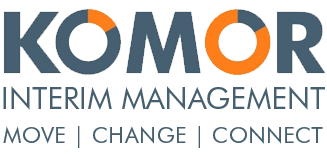What does ‘’Return on Interim Management’‘ stand for and could you explain your motto ’‘Resulting instead of Consulting’’ in more detail?
In this interview with the Interim Management provider Bridge imp GmbH from Grünwald near Munich, Germany, I will talk about RoIM – Return on Interim Management – and my motto Resulting instead of Consulting.
Ralf H. KOMOR in conversation with the provider Bridge imp
>> What are the criteria that determine whether you win a mandate?
My availability, the “cultural fit” and my professional know-how.
The daily rate is rather secondary and in my case not negotiable – I know my value. The difficulty is not so much in getting projects, but in the art of choosing the right mandate. By right I mean the professional and personal fit. If I am asked for a new mandate, whether it is via an interim provider, Xing, LinkedIn or my personal network, the first thing to clarify is with what intention the company wants to bring me on board as an Interim Manager. It is important to know the expectations of the client in order to steer all steps in the right direction. The “cultural fit” plays a particularly decisive role: Does the interim manager have the right stable smell, does he fit in with the company culture, will he be well accepted by the employees?
“Transparency is the mother of trust”
In addition to the Interim Manager’s knowledge of the industry, trust is particularly important – after all, a “temporary manager” gains an insight into internal processes. In addition, there is the factor of transparency, because transparency is the mother of trust. If an Interim Manager also fits into the team, nothing more stands in the way of success.
>> Are current daily rates of Interim Managers excessive?
Both the client and the Interim Manager are entrepreneurs and therefore have the obligation to purchase a service at the best offer.
I have to ask the client whether this service can be realised in the planned time and according to the expectations. This usually means that an own, also highly qualified person must spend 100% of his time on this project and must be fully assigned to it. Correspondingly, it must also give up its actual tasks, which are practically suspended in time. This is not realistic in most cases.
“High performance and top quality at a low price will not exist in Interim Management either”
Whether you pay 1,000, 2,000 or 3,000 €: it always depends on what you get for it. High performance and top quality at a low price will not exist in Interim Management either. In any case, the client has a big advantage: a fixed daily rate instead of ongoing personnel costs! If we are not on duty, then we do not charge (illness, vacation, further education). And the best thing for the entrepreneur: at the end of the mandate we simply leave, without severance pay, without an appointment with the labour court.
>> What does „Return on Interim Management“ stand for?
Return on Interim Management (RoIM) is the ratio of income to expenses of an Interim Management mandate.
On the one hand, there is the clearly calculable expenditure for the assignment of an Interim Manager: fee, provider commission, additional costs for travel and overnight stays. These costs are calculated clearly, simply and quickly. However, I do not see us as an expense item, but as an income item.
The study “Interim Leadership Personalities” of the Helmut Schmidt University shows that in 86% of the mandates the added value exceeds the costs employed many times over 1). Ludwig Heuse GmbH 2, 3) came to the conclusion in a large evaluation of 700 projects that in only 3% of cases the RoIM was less than 1. 87% of the mandates brought in more than double the costs, 20% even more than ten times! The overall RoIM average 11,9 times.
For simple, urgent work at a low management level (e.g. bridging the sick leave of a group leader, strengthening a project management team on a large construction site), the RoIM is usually low, as it is in principle a 1:1 replacement of personnel for a short period of time. The more demanding and high-level an IM is used – and this is what most requests are about – the RoIM is typically at factor 10 or higher. This means that our high-quality work can often generate ten times the return. These complex projects are where our expertise pays off best. In addition, RoIM is measured up to a factor of 20 when optimising divisions or entire companies, and even up to a factor of 50 when restructuring!
I also distinguish between direct and indirect RoIM.
The RoIM can be seen very quickly, especially in purchasing. If an Interim Purchasing Manager buys products or services at a lower price than before, immediate success is on paper.
In my case it is a mix: depending on the length of the sales cycle (in plant construction up to three years) and the complexity of the buying center (ERP software), the results can at best be found at the end of the mandate, but often only months later in the sales. Here you can define other KPIs (Key Performance Indicators) to monitor success: e.g. number of website visitors, number of enquiries, increased offer activity, higher order volume, etc. In this case of the long term, the success can also be seen over e.g. 2 years and the RoIM can be calculated in retrospect.
In strategically oriented mandates, e.g. in management or business development, the focus is on change management for an entire area: the transformation of a company, the implementation of a new business model or the development of a start-up. Here, of course, quantitative results can only be determined indirectly after several years.
>> What are common mistakes in thinking that entrepreneurs make against the background of RoIM?
Often, the expected performance is not precisely defined beforehand. It remains nebulous. The spoken word is different from the unspoken expectations. That is why a crystal-clear definition of the project, contents, priorities and expectations (also in terms of time) is important before signing the contract. Therefore, I have developed a checklist, which I make available on my homepage. Using this checklist, I summarise the common understanding of the project in a document – this is the basis for my work.
In classical bridging, i.e. the pure bridging of a vacancy, where the vacancy is only a few weeks or a few months, the RoIM is usually not very high. The client must be aware of this. This is about maintaining organisational processes, working through ongoing tasks, rather than using our expertise.
“The Onboarding is extremely short – free over-qualification included”
Clients also think that we need a long time to get used to the job. In fact, we can get started after just a few days – depending on the complexity of a mandate. There is no “100-day grace period” for Interim Managers. The onboarding is extremely short – free over-qualification and broad experience included, because the fee is usually based on the task to be performed and not on the actual skills of the Interim Manager.
>> Could you explain your motto “Resulting instead of Consulting” in more detail?
In addition to their professional specialisation, temporary managers have valuable and long management experience. The key competence is change management: 94% of Interim Managers have change experience. An Interim Manager can share his findings with stakeholders unfiltered and without vanity. He is a local driving force with a high degree of implementation. He solves the tasks at hand independently. Thanks to his many years of specialist expertise and regular training, he is always close to the pulse of the times.
Consultants bring a lot of external knowledge with them, deliver concepts and have a high level of methodological competence to develop a problem solution. They describe open-ended processes as the result of their efforts: what does the problem look like, how can it be solved in principle?
Interim Managers, on the other hand, intervene in day-to-day operations and take direct responsibility for implementation. We are under surveillance every day. We have extensive expertise in solving daily problems directly and immediately.
“Consultants describe, Interim Managers create results!”
This is what distinguishes an Interim Sales Manager from a classic consultant. It is not about consulting, but about results. A qualified Interim Sales Manager develops new approaches, supports employees and gets sales going.
We Interim Managers develop parallel to the normal business (which we also take over) custom-fit solution concepts, which can also be realised with a high degree of implementation security. This is the significant added value compared to a management consultant: consultants describe, Interim Managers create results! This is the fixed goal of our commitment.
Sources:
1) Helmut-Schmidt-Universität: “Interim Leadership Personalities” – Studie 2017, Seite 3
2,3) “Interim Management in Deutschland”, Studien der Ludwig Heuse GmbH, 2014 und 2015 – jeweils Seite 10
To the blog post of Bridge imp click here.





